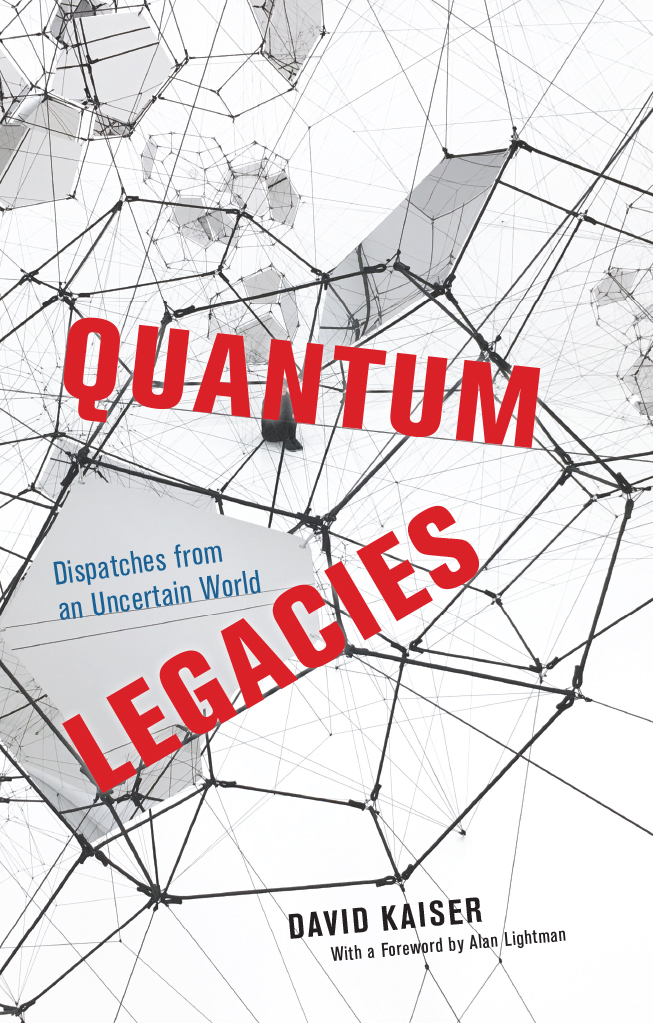
Quantum Legacies
QUANTUM LEGACIES
Dispatches from an Uncertain World
DAVID KAISER
With a Foreword by Alan Lightman
The University of Chicago Press
Chicago and London
The University of Chicago Press, Chicago 60637
The University of Chicago Press, Ltd., London
2020 by The University of Chicago
All rights reserved. No part of this book may be used or reproduced in any manner whatsoever without written permission, except in the case of brief quotations in critical articles and reviews. For more information, contact the University of Chicago Press, 1427 E. 60th St., Chicago, IL 60637.
Published 2020
Printed in the United States of America
29 28 27 26 25 24 23 22 21 20 1 2 3 4 5
ISBN-13: 978-0-226-69805-2 (cloth)
ISBN-13: 978-0-226-69819-9 (e-book)
DOI: https://doi.org/10.7208/chicago/9780226698199.001.0001
Library of Congress Cataloging-in-Publication Data
Names: Kaiser, David, author.
Title: Quantum legacies : dispatches from an uncertain world / David Kaiser ; with a foreword by Alan Lightman.
Description: Chicago : University of Chicago Press, 2020. | Includes bibliographical references and index.
Identifiers: LCCN 2019037201 | ISBN 9780226698052 (cloth) | ISBN 9780226698199 (ebook)
Subjects: LCSH: Quantum theory. | PhysicsHistory.
Classification: LCC QC173.98.K358 2020 | DDC 530.12dc23
LC record available at https://lccn.loc.gov/2019037201
 This paper meets the requirements of ANSI/NISO Z39.481992 (Permanence of Paper).
This paper meets the requirements of ANSI/NISO Z39.481992 (Permanence of Paper).
For Ellery and Toby: quantum wondertwins
CONTENTS
Alan Lightman
: : Alan Lightman
Physics has always attracted those thinkers who might have been philosophers, or musicians. Newton. Einstein. Heisenberg.
Autumn. Theres a smell of fall leaves through an open window. We sit at a long table. A bakers dozen of us, I would guess. An associate provost of the institution, a couple of theater directors, a couple of playwrights, a financial person or two, an actress constantly changing her face as if putting on makeup in the dressing room, and a few physicists. David Kaiser at one end of the table, always razor sharp in dress and attentiveness. Another physicist enters the room and apologizes for being late. We are discussing the sponsorship of new plays about science, some not even yet written, to be performed at a theater nearby. It is a happy collision between science and art, between the icy equations of Newton and Einstein and the heart-wrenching dramas of Chekhov and Wilde. The deliberate joined with the spontaneous. The rational with the intuitive. The quantitative with that which cannot be quantified. Several times a year, we gather here to enter and bless this world between worlds.
It isnt surprising that Professor Kaiser perches at one end of the table. Trained as both a physicist and a historian of science, over the years he has developed into a first-rate storyteller, with his articles and books tracing not only scientific ideas but also the personal lives of the scientists and the institutional and cultural forces shaping the landscape. All revealed in the delightful essays in this book. But still. Why so many physicists at the table?
Physics attempts to reduce the world to a small number of fundamental particles and forcesthe bare minimum to explain everything in the physical cosmos. I would argue that such a project reflects a deep human desire to make order out of the world, both the animate and the inanimate, and thus far transcends the mathematical runes of Newton and Einstein. The Gestalt psychologists say that we humans unavoidably try to reduce the world into meaningful patterns. Perhaps that act is what holds off insanity. The constellations, for example. If we see a random collection of dots, we parse it into some kind of figure against a background. If we see a broken circle, we mentally fill in the missing pieces. Henry Adams tried to understand the historical rise and fall of human civilizations in terms of energy and the second law of thermodynamics. Plato claimed that God made the world out of just four fundamental elements: fire, earth, air, and water. Ancient India used only three: fire was associated with bone and speech, water with blood and urine, earth with flesh and mind. We are pattern seekers and pattern makers. Physics is the ultimate distillation of that need. Art as well. Perhaps that is why there are so many physicists at this table.
Although these various human needs work together within our psyche, modern science owes much of its success to envisioning a disembodied, dispassionate universe out there, to walling itself off from the personal, and particularly the emotional. The scientists who planned the first human landing on the moon in 1969 calculated trajectories and rocket thrusts so that the spacecraft and the moon would be at the same place at the same time. Those calculations did not include the mood of the astronauts or anything about their personal lives.
A closely related issue: science does not normally concern itself with the narrative of its own (human) history of discovery. In this sense, as well as in others, science distinguishes itself from the humanities. The body of knowledge in the humanities might be called horizontalthe seminal works of all eras are considered equally relevant and enriching. The works of no era are considered superior to those of any other era. When we study philosophy, for example, we might begin with Confucius and Plato and Aristotle and move toward Nietzsche and Bertrand Russell. Or with literature, we might begin with the Iliad and the Odyssey and slowly advance to The Great Gatsby. There is no sense in which The Great Gatsby is considered more correct or wiser than the Iliad. By contrast, science is a vertical endeavor. The theories, data, and knowledge of each century are thought to improve and replace the understanding of previous centuries. In predicting the orbits of planets and other gravitational phenomena, Einsteins theory of gravity is simply more accurate than Newtons theory of gravity. Period. A graduate student in science studies the most up-to-date results of her field before launching into research at the frontiers of the field. There is no time, and often little interest, in the history of the subject, which now lies in the dusty stacks of libraries alongside candles for lighting and slide rules for calculating. My college textbook on heat, titled Thermal Physics, is full of equations describing the modern understanding of heat as the random motion of atoms and molecules. There isnt a single word about the earlier theory of heat as a material fluid, called phlogiston. Or about the colorful story of Benjamin Thompson (17531814), who began life as a schoolteacher in New Hampshire and later fled to England after the fall of Boston in the Revolutionary War and became head of the Bavarian army. It was Thompson who discovered that heat was motion, not substance, by way of his job superintending the boring of cannon in the military arsenal at Munich. In his essay read before the Royal Society of London in 1798, Thompson wrote, It frequently happens that in the ordinary affairs and occupations of life, opportunities present themselves of contemplating some of the most curious operations of Nature.... I was struck with the very considerable degree of Heat which a brass gun acquires, in a short time, in being bored... in the Friction of two metallic surfaces.
Next page
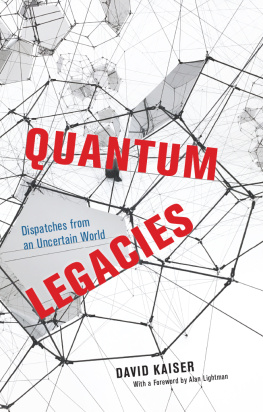
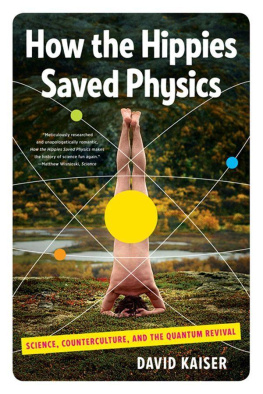
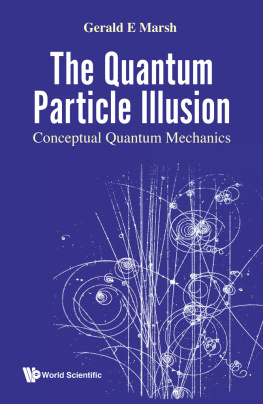
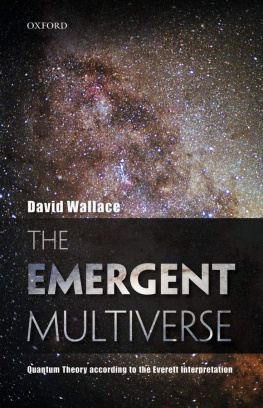

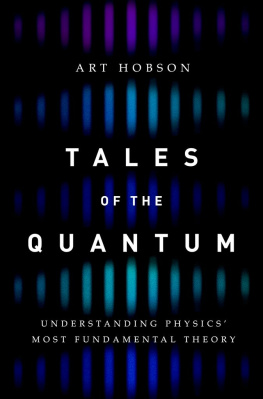
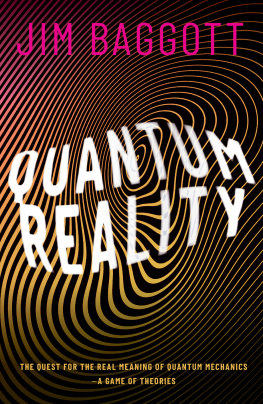
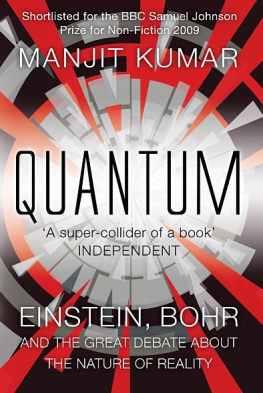
![David Orrell [David Orrell] - Quantum Economics](/uploads/posts/book/114631/thumbs/david-orrell-david-orrell-quantum-economics.jpg)
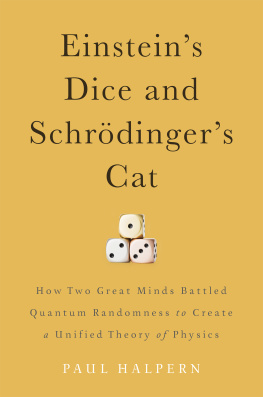
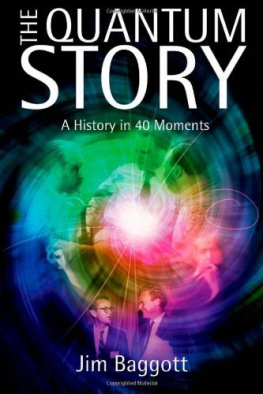

 This paper meets the requirements of ANSI/NISO Z39.481992 (Permanence of Paper).
This paper meets the requirements of ANSI/NISO Z39.481992 (Permanence of Paper).